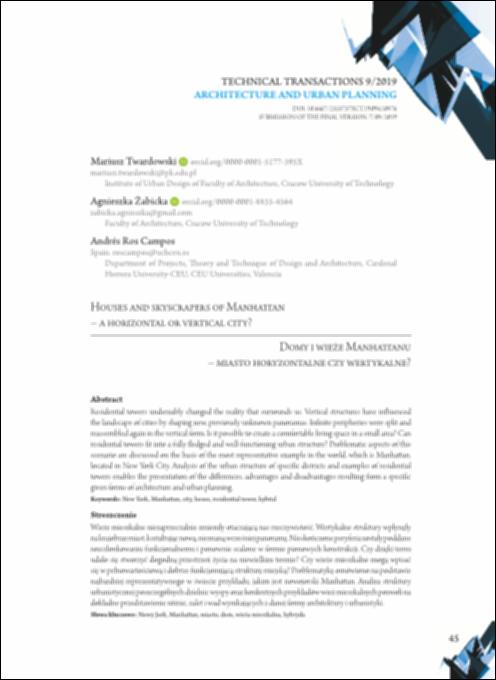Please use this identifier to cite or link to this item:
http://hdl.handle.net/10637/16239Houses and skyscrapers of Manhattan: a horizontal or vertical city?
| Title: | Houses and skyscrapers of Manhattan: a horizontal or vertical city? |
| Other Titles: | Domy i wieże Manhattanu: miasto horyzontalne czy wertykalne? |
| Authors : | Twardowski, Mariusz Żabicka, Agnieszka Ros Campos, Andrés |
| Keywords: | Ciudad; Town; Construcción urbana; Urban construction; Edificio; Building; Arquitectura; Architecture; New York; Manhattan; Urbanismo; Town planning |
| Publisher: | Wydawnictwo Politechniki Krakowskiej |
| Citation: | Twardowski, M., Żabicka, A. & Ros Campos, A. (2019). Houses and skyscrapers of Manhattan: a horizontal or vertical city?. Technical Transactions, 9(116), 45 - 56. https://doi.org/10.4467/2353737XCT.19.094.10876 |
| Abstract: | Residential towers undeniably changed the reality that surrounds us. Vertical structures have influenced the landscape of cities by shaping new, previously unknown panoramas. Infinite peripheries were split and reassembled again in the vertical form. Is it possible to create a comfortable living space in a small area? Can residential towers fit into a fully fledged and well-functioning urban structure? Problematic aspects of this scenario are discussed on the basis of the most representative example in the world, which is Manhattan, located in New York City. Analysis of the urban structure of specific districts and examples of residential towers enables the presentation of the differences, advantages and disadvantages resulting from a specific given forms of architecture and urban planning. Wieże mieszkalne niezaprzeczalnie zmieniły otaczającą nas rzeczywistość. Wertykalne struktury wpłynęły na krajobraz miast, kształtując nową, nieznaną wcześniej panoramę. Nieskończone peryferia zostały poddane rozczłonkowaniu funkcjonalnemu i ponownie scalone w formie pionowych konstrukcji. Czy dzięki temu udało się stworzyć dogodną przestrzeń życia na niewielkim terenie? Czy wieże mieszkalne mogą wpisać się w pełnowartościową i dobrze funkcjonującą strukturę miejską? Problematykę omówiono na podstawie najbardziej reprezentatywnego w świecie przykładu, jakim jest nowojorski Manhattan. Analiza struktury urbanistycznej poszczególnych dzielnic wyspy oraz konkretnych przykładów wież mieszkalnych pozwoli na dokładne przedstawienie różnic, zalet i wad wynikających z danej formy architektury i urbanistyki. |
| URI: | http://hdl.handle.net/10637/16239 |
| Rights : | http://creativecommons.org/licenses/by-sa/4.0/deed.es Open Access |
| ISSN: | 0011-4561 2353-737X (Electrónico) |
| Issue Date: | 27-Sep-2019 |
| Center : | Universidad Cardenal Herrera-CEU |
| Appears in Collections: | Dpto. Proyectos, Teoría y Técnica del Diseño y la Arquitectura |
Items in DSpace are protected by copyright, with all rights reserved, unless otherwise indicated.


